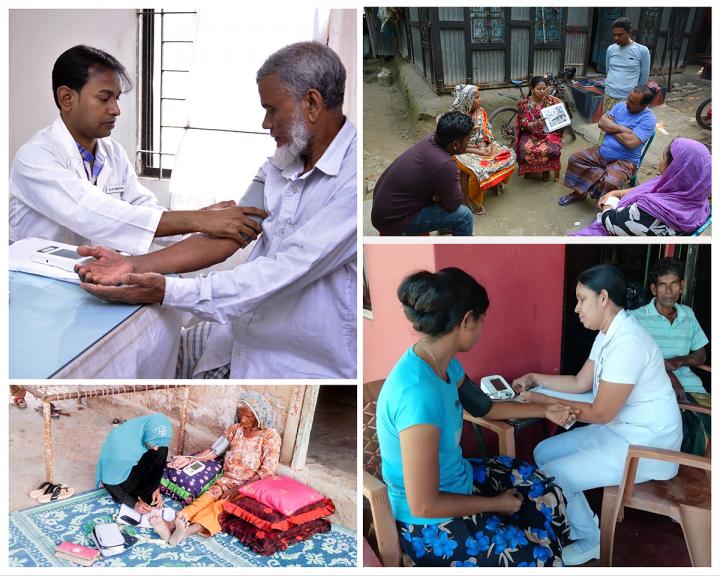Low-cost hypertension management intervention shown to be cost-effective, scalable in rural South Asia

Credit: ICDDR, Bangladesh (Mr Nantu Chakma and Dr Aliya Naheed); Aga Khan University, Pakistan (Dr Sahar Siddiqui and Dr Imtiaz Jehan); and University of Kelaniya, Sri Lanka (Ms Chamini Kanatiwela-de Silva…
SINGAPORE, 29 March 2021 – A low-cost intervention to improve hypertension–or high blood pressure (BP)–prevention and management can be cost-effectively scaled up for rural communities in low- and middle-income countries, according to findings from a multi-country trial published in The Lancet Global Health.
Led by Duke-NUS Medical School in Singapore, the Control of Blood Pressure and Risk Attenuation–Bangladesh, Pakistan, Sri Lanka (COBRA-BPS) trial, conducted in partnership with the International Centre for Diarrhoeal Diseases Research, Bangladesh (ICDDR,B), Aga Khan University in Pakistan, the University of Kelaniya in Sri Lanka, analysed the budget impact and cost-effectiveness of a package of healthcare measures implemented between 2016 and 2019 in 30 rural communities. These included tapping community healthcare workers, who normally conduct maternal and childcare visits, to provide door-to-door BP monitoring and lifestyle coaching; referrals of people needing professional care to a general practitioner; and the provision of subsidies for travel and additional medication costs to people with low incomes and poorly controlled hypertension.
“Cost-effectiveness studies are important for understanding the value-for-money spent on an intervention, while budget impact analyses indicate its affordability,” said Professor Tazeen Jafar, from Duke-NUS’ Health Services and Systems Research (HSSR) Programme, who spearheaded the study in all three countries. “These indicators are important for health planners when they have to choose from a variety of interventions for a number of conditions.”
Prof Jafar and her team calculated the trial’s total costs over each of the three years. Based on this, they calculated how much the trial cost per participant treated and per capita population in each country. Finally, they calculated how much it would cost to scale up the programme country-wide, and how much would be saved by catching and managing hypertension early on.
“Studies have shown that reducing BP also reduces the risk of developing coronary heart disease, stroke and cardiovascular diseases (CVD), thus offering the potential for low-cost interventions targeting BP and other CVD risk factors to be both cost-effective and scalable,” explained Professor Eric Finkelstein, also from Duke-NUS’ HSSR Programme, and a co-senior author of the study.
The team found the per-participant and per-capita costs of the trial’s first year were US$10.65/$0.63 for Bangladesh, $10.25/$0.29 for Pakistan, and $6.42/$1.03 for Sri Lanka. The costs were less for the next two years in Bangladesh and Pakistan but increased slightly in Sri Lanka. These inter-country differences were due to different numbers of community health workers requiring training, general differences in costs and wage rates, and the difference in the prevalence of hypertension.
“Despite having a universally state-funded healthcare system that provides BP-lowering medication free at the point of delivery, the great majority of hypertensives in Sri Lanka have uncontrolled BP,” said Professor Asita de Silva, from the University of Kelaniya, who is the principal investigator of the COBRA-BPS study in Sri Lanka. “Improving BP control through cost-effective interventions are extremely important to address this public health challenge and ultimately reduce overall vascular disease burden.”
Due to the relatively low costs of the trial, the scientists estimate that scaling it up to country level would cost each government less than $10.70 per participant treated in the first year. Costs in subsequent years would decrease as only refresher trainings would be required.
“Uncontrolled blood pressure is a major risk factor for heart attack, stroke and kidney failure in Bangladesh, and treating such chronic conditions is expensive. The COBRA-BPS intervention is a clear solution for controlling blood pressure at low cost that can be easily scaled up in Bangladesh,” said Dr Aliya Naheed, who heads the Initiative for Non-Communicable Disease, Health Systems and Population Studies Division at the International Centre for Diarrhoeal Disease Research, Bangladesh (ICDDR,B), and is the principal investigator of the COBRA-BPS trial in Bangladesh.
The team is currently discussing how to facilitate scaling up the programme in collaboration with provincial health authorities in the three countries.
“Hypertension has reached epidemic proportions in Pakistan, affecting one in three adults 45 years or older,” said Dr Imtiaz Jehan, an associate professor at Aga Khan University’s Department of Community Health Sciences, and the COBRA-BPS principal investigator in Pakistan. “It is a largely unrecognised illness and lowering BP can be the single most important way to prevent the rising rates of heart disease and deaths in the country.”
Prof Jafar added, “This study provides the first clear evidence that a standardised and effective community-based hypertension management programme is affordable and scalable in all three countries.”
The researchers anticipate the results can also guide trials in other South Asian countries and are looking to expand the programme throughout the region.
###
Media Contact
Federico Graciano
[email protected]
Original Source
https:/
Related Journal Article
http://dx.




